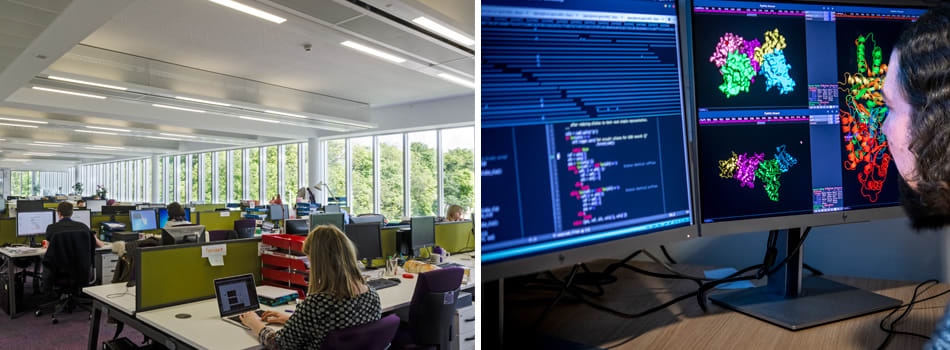Funded PhD projects for Quantitative Scientists at the MRC Human Genetics Unit, Edinburgh
"Are you a graduate level physicist, mathematician, statistician, engineer, computer scientist, bioinformatician or similar, seeking PhD training to make a difference in medicine and biology?" If so, we want you! No previous biological experience required.
To understand how our DNA affects health and disease we need to combine research in multiple disciplines. Quantitative skills developed in other sciences can be applied to large complex datasets generated in biomedical research in order to, for example, design new drugs to target cancer, develop statistical approaches to find mutations that cause disease and mathematically model molecular interactions underpinning human health.
Applications are invited from outstanding quantitative scientists to apply their skills to biomedical research by joining an MRC funded 4-year multi-disciplinary PhD programme at the MRC Human Genetics Unit (HGU) at the Institute of Genetics and Cancer, University of Edinburgh.
Our PhD programme harnesses the latest computational and experimental technologies and relates molecular mechanisms to human disease. The Institute has a cross-disciplinary training program for post-doctoral scientists and will provide similar training to cross-disciplinary PhD candidates. We have a variety of research groups who need your computational and analytical skills. PhD projects will typically include strong quantitative components.
Programme structure (shared with MRC HGU Human Genetics, Genomics and Disease PhD students):
First 6 months: students participate in structured teaching covering genome regulation, disease mechanisms, disease models, biomedical genomics, computational and statistical training and a journal club. Students also undertake 2 mini-projects to experience different research environments.
Subsequent years: students develop one of their mini-projects for the remaining 3.5 years.
Example projects (subject to availability, please visit our website for up-to-date information; some projects can be adapted to provide stronger quantitative components):
- High-throughput discovery of disease mutations by in vivo deep mutational scanning
- In silico mutational scanning to understand and predict protein function and genetic disease
- Using single molecule approaches to understand DNA methylation maintenance
- Dissecting clonal heterogeneity with cellular lineage tracing in cancer and development
- Leveraging rare-disease modelling to identify fundamental biological mechanisms that contribute to human disease
- How do tissue mechanics affect cell state?
- Understanding chromosome structure in health and disease
- Investigating long-range enhancers and 3D genome topology at a human craniofacial disease locus
- How do mammalian germ cells pass on the correct number of chromosomes to the next generation?
- Mechanisms of long-range enhancer function
- Regulation and function of the nonsense-mediated decay (NMD) pathway
- The enemy within: ribonucleotides, DNA replication and disease
- Defining molecular principles of tubulin isotype diversity in human health and disease
- Targeting melanoma cellular heterogeneity
- Functional analysis of variants, genes and pathways associated with common eye conditions
- Targeted protein degradation in human disease models
Who should apply?
Applicants should have a 1st class, 2.1 or Masters degree from a UK or international university in any relevant discipline including physics, mathematics, statistics, engineering, computer science, bioinformatics or similar. We are seeking motivated students keen to work across scientific disciplines to further biomedical research.
Applicants with biomedical backgrounds should apply through the Human Genetics, Genomics and Disease programme on our website.

 Continue with Facebook
Continue with Facebook




